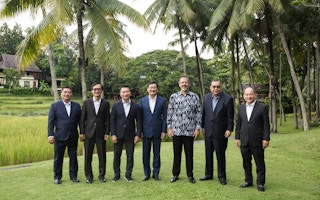Six of Southeast Asia’s largest stock exchanges have collaborated to produce a set of environmental, social and governance (ESG) metrics aimed at encouraging more sustainable investments in the region.
To continue reading, subscribe to Eco‑Business.
There's something for everyone. We offer a range of subscription plans.
- Access our stories and receive our Insights Weekly newsletter with the free EB Member plan.
- Unlock unlimited access to our content and archive with EB Circle.
- Publish your content with EB Premium.
Under the collaborative banner Asean Exchanges, the stock market operators of Indonesia, Malaysia, the Philippines, Singapore, Thailand and Vietnam launched the full set of their core sustainability metrics on Tuesday, which saw the inclusion of 10 governance metrics.
“Together, the core metrics will serve as a common basis for member stock exchanges to build upon in order to drive sustainability among their listed companies. This initiative is intended to encourage the disclosure of consistent ESG information on material topics,” Asean Exchanges said in a statement.
The core metrics are also meant to bolster sustainable investment across the region, aligning with the growing global trend, the exchanges said.
“ESG issues have gained prominence at the global level and serve as key factors for investors when making investment decisions. The Asean Exchanges common ESG metrics therefore provide a guidepost for our companies in reaching international investors and facilitating capital flows into the region,” said Stock Exchange of Thailand (SET) president Pakorn Peetathawatchai.
The new governance metrics include measurements that focus on the responsibilities of the board, business ethics, as well as the treatment of shareholders. These include, among others, the percentage of board seats occupied by men and women, the proportion occupied by independent directors or commissioners, and details about the company’s code of ethics or conduct.
These new additions are meant to complement the Asean Exchanges’ previously published list of 4 environmental metrics and 13 metrics for social issues, which were published in March and December 2022 respectively. Greenhouse gas emissions as well as energy and water consumption are included under the existing environmental metrics, while gender diversity, employee safety and human rights are included as social metrics. ESG metrics from the World Federation of Exchanges were used as the main reference for setting the core social metrics, said Asean Exchanges.
These developments began with the establishment of an ESG Working Group by the chief executive officers of the region’s exchanges in 2021, which agreed that they would focus on sustainability reporting as the foundational topic to guide their collaborative ESG efforts.
At the 36th meeting of the Asean Exchanges’ CEOs hosted by SET last week, the region’s market leaders discussed future initiatives to enhance ESG collaboration. In addition to the six existing members, representatives from the Cambodia Stock Exchange and Lao Securities Exchange were also present.
“The CEOs recognised the complementarity of ASEAN Exchanges and the potential from market connectivity opportunities through depository receipts cooperation,” they said. The exchanges are also exploring ways to further enhance products and regional promotion.
Sustainability reporting is currently mandatory for all listed companies in Indonesia, the Philippines, Singapore, Thailand and Vietnam. Financial institutions and issuers in Indonesia are also subject to the same rules, according to information from the Asean Exchanges.
In Malaysia, the large publicly-listed companies on Bursa Malaysia’s two largest markets, must also comply with sustainability reporting rules. Singapore-listed companies have the most stringent sustainability reporting requirements compared to other Asean markets, as they are required to comply with recommendations under the Task Force for Climate-related Financial Disclosures, a framework for companies to disclose climate risk.










